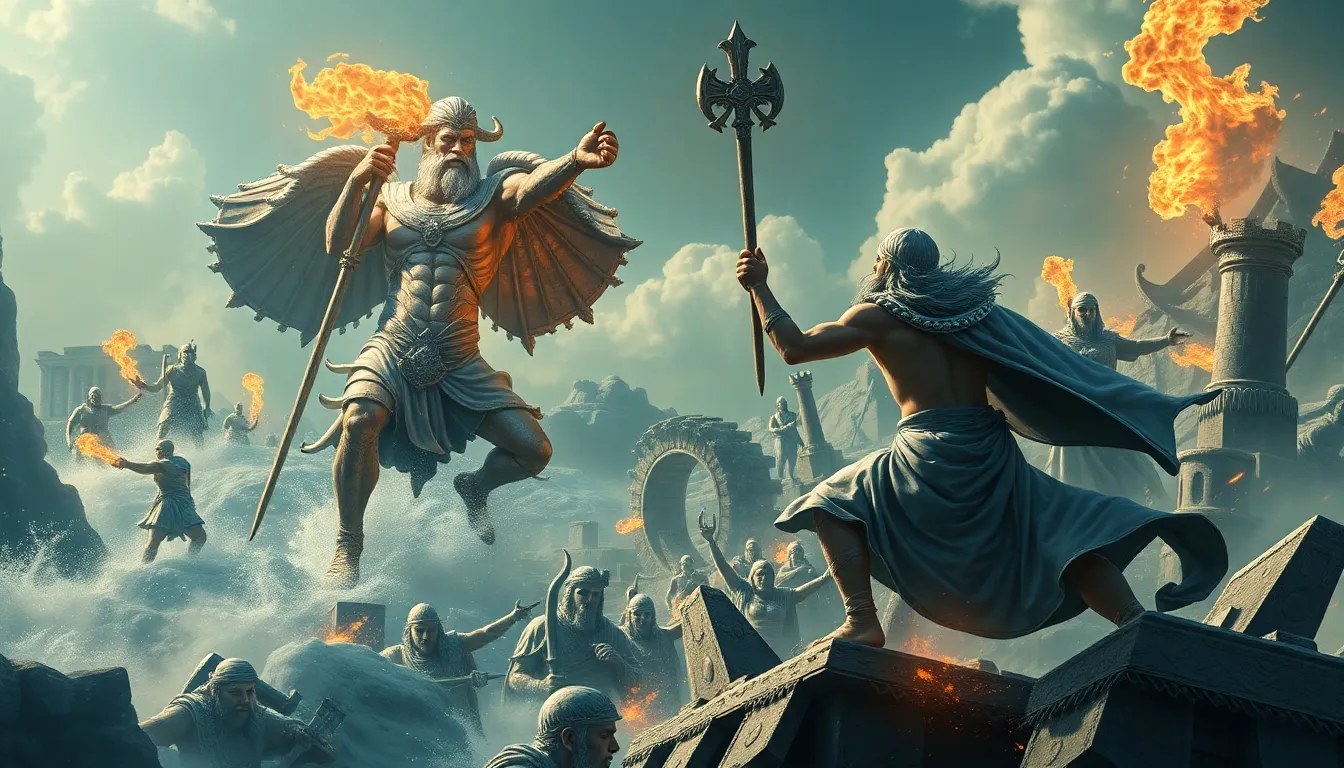The Most Epic Battles Between Mortals and Greek Gods
I. Introduction
In Greek mythology, the conflicts between mortals and gods are profound narratives that illustrate the struggle for power, the quest for knowledge, and the consequences of divine wrath. These epic battles often symbolize the eternal struggle of humanity against the forces of fate and the whims of the divine. This article will explore some of the most significant battles between mortals and gods in Greek mythology, highlighting the characters, the stakes, and the outcomes of these legendary confrontations.
II. The Clash of Titans: Prometheus vs. Zeus
Prometheus, a Titan known for his intelligence and cunning, defied Zeus by stealing fire from the gods and giving it to humanity. This act of rebellion was not just a gift; it was a transformative moment that allowed mortals to progress and advance in civilization.
The consequences of Prometheus’ actions were dire. Zeus, angered by this betrayal, punished Prometheus by having him bound to a rock where an eagle would eat his liver daily, only for it to regenerate each night. This eternal punishment emphasizes the theme of suffering in the pursuit of knowledge and the price of defying divine authority.
The epic battle between Prometheus and Zeus was not a physical confrontation but a clash of wills and ideologies. The aftermath of this conflict reshaped humanity’s relationship with the gods, marking a significant moment in mythological history.
III. Heracles and the Twelve Labors
Heracles, renowned for his strength and heroic feats, was subjected to a series of challenges known as the Twelve Labors, imposed by Hera and other gods who sought to undermine him. Each labor presented formidable foes and mythical beasts, showcasing Heracles’ resilience and bravery.
- Nemean Lion: Heracles defeated this invulnerable beast with his bare hands, symbolizing the triumph of strength over seemingly insurmountable odds.
- Hydra: This multi-headed serpent was a test of cunning as much as strength, representing the complexity of facing multiple challenges simultaneously.
- Ceryneian Hind: Capturing this swift creature required not only strength but also patience and determination.
The symbolism of Heracles’ struggles is profound. Each labor represents a battle against the manipulation of the gods, particularly Hera, who sought to instill obstacles in Heracles’ path. His eventual triumphs symbolize human tenacity in the face of divine adversity.
IV. Achilles vs. Hector: The Duel at Troy
The Trojan War is a backdrop for one of the most famous duels in Greek mythology: that of Achilles and Hector. The war itself was instigated by the gods, who intervened for their favorites, leading to a conflict charged with divine manipulation and human emotion.
Achilles’ motivations were deeply personal; he sought revenge for the death of his close friend Patroclus, killed by Hector. This personal vendetta elevated the duel beyond mere combat; it became a manifestation of rage, honor, and fate.
Achilles’ victory over Hector had profound implications for the war. It not only shifted the tide in favor of the Greeks but also illustrated the tragic consequences of human conflict exacerbated by divine involvement. The gods played a critical role, influencing outcomes and shaping the destinies of both mortals and their fates.
V. Odysseus and the Wrath of Poseidon
Odysseus’ journey home after the Trojan War is marked by numerous challenges, many of which arise from the wrath of Poseidon, the god of the sea. Odysseus’ cleverness and resourcefulness are tested against the forces of nature and divine intervention.
Key encounters during his journey include:
- The Cyclops: Odysseus outsmarted the one-eyed giant Polyphemus, illustrating the theme of wit over brute strength.
- The Stormy Seas: Poseidon’s relentless pursuit of Odysseus symbolizes the unpredictable nature of fate and the gods’ power over mortals.
The themes of perseverance and resilience against divine wrath resonate throughout Odysseus’ story, showcasing the human spirit’s capacity to endure and overcome even the most formidable challenges.
VI. Theseus vs. Minotaur: A Battle of Fate
The Minotaur, a monstrous creature born from the union of Pasiphaë and a bull, represents the chaos and complexity of divine manipulation. Theseus, the Athenian hero, embarks on a quest to slay the Minotaur, aided by the goddess Ariadne who provides him with a thread to navigate the labyrinth.
Theseus’ journey symbolizes the struggle against fate and the courage to confront one’s fears. His victory over the Minotaur is not only a personal triumph but also a significant act of bravery against a creature born from divine whimsy.
The implications of this battle extend beyond mere heroism, reflecting the ongoing struggle between human determination and the challenges imposed by the gods.
VII. The Fate of Pentheus: Mortals vs. Dionysus
The conflict between Pentheus, the king of Thebes, and Dionysus, the god of wine and revelry, serves as a cautionary tale about the consequences of hubris and the denial of the divine. Pentheus refuses to acknowledge Dionysus’ divinity and attempts to suppress the worship of the god.
This conflict culminates in tragic consequences. The themes of hubris and the denial of divine authority lead to Pentheus’ downfall, as he is ultimately torn apart by the frenzied Maenads, followers of Dionysus. This narrative illustrates the dire consequences of rejecting the gods and the importance of recognizing the divine in everyday life.
VIII. Conclusion
The battles between mortals and gods in Greek mythology are not merely tales of conflict; they are rich narratives that shape the understanding of human nature, divine power, and the interplay between fate and free will. These epic confrontations serve as timeless lessons about bravery, resilience, and the consequences of defying the divine.
As we reflect on these stories, we recognize their enduring legacy in modern culture and literature. The struggles of heroes against gods continue to resonate, reminding us of the complexities of existence and the eternal dance between humanity and the divine.




